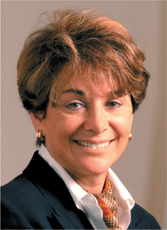CHAPTER
15
Parents, Mentors,
and Role Models:
Looking Over the Pickle Barrel
Who’s the teacher? Who’s the student?
—Leo McCarthy
Former California Lieutenant Governor
We’re all just links in a chain.
—Bob Dylan
Think back to your formative years: grammar school, high school, even college, and your first job. Who was there for you? Who saw the talent, the intelligence, the possibilities in you that you could not see in yourself? Does more than one person come to mind? An uncle or an aunt? A grandparent, a neighbor, or a teacher?
For Steve Blank, who grew up in New York City, the seeds that would lead to his achievements were sown by his immigrant parents:

They came over in steerage, and took the tour of New York Harbor under the Statue of Liberty. They came through Ellis Island and worked in sweatshops in the Lower East Side of New York. They dreamed of opening a grocery store. After working in the garment district for a decade, they wanted to work for themselves.
I guess you could say my parents did a start-up and were small business entrepreneurs. Rather than taking over the universe, they simply wanted to feed the family. They owned a little grocery store and their entire team was my two parents, and then my sister and me when we were old enough and could see over the pickle barrel. Then it was our turn.
The executives talked about two huge influences in their early lives and in their successes: their parents and their mentors. They started life with bonds to their parents and families, then later met people who helped shape their futures. They learned ways of being from both sources that powered them to top positions in corporate America.
Audrey MacLean credits much of her success to growing up in the Darwinian environment of a large family. “In a family of ten, you turn your head and your brother steals the meat off your plate. And if you don’t say something interesting at the table, the conversation jumps quickly to someone else.”
How these early influences shaped their destinies was a major theme in the interviews.
The executives shared their parent and mentor stories, often through tears of gratitude. Taken together, their stories show us why finding and using your champion is so critical, and how such influence can last your entire lifetime.
As you read the following stories from our senior executives, think about who those mentors have been for you. Are they still alive? Have you seen them lately? Have you told them how their influence has affected you?
Seeing Potential & Changing Lives
Steve Blank advised, “If you’re lucky in your twenties and thirties, you will find somebody who will take an interest in your career, and will change your life.” That mentor’s impact often starts when he or she sees abilities and potential in you that you can’t see in yourself.
That’s what happened to Anna Eshoo. When she talks about Leo McCarthy, California Lieutenant Governor from 1983 to 1995, her voice gets quiet. “He took me under his wing. I didn’t see in myself what he saw in me.” Anna recalled their deep friendship and his encouragement of her political career:
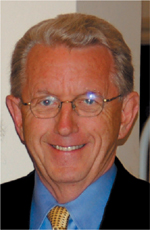
Leo McCarthy
He came to a speaking event early in my first run for Congress. After it was over, I called him at home since I didn’t get a chance to talk to him afterwards. I said, ‘How did I do?’ He said simply, ‘Who’s the teacher? Who’s the student?’
Anna was very close to her parents who attended her swearing in as a member of Congress in 1993. She recalled, “Every time I go on the Floor (of the House of Representatives) I look up to the section where they sat in the gallery that day in 1993. I sense them being there and watching everything that I do.”
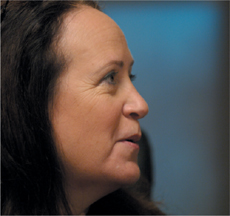
Felicia Marcus
Felicia Marcus grew up in Los Angeles and started her career as an attorney with an emphasis on environmental law. She later went to work for the City of Los Angeles and was soon appointed by Mayor Tom Bradley to run the Board of Public Works. When offered the position by the deputy mayor, Felicia thought he was crazy. “How can I possibly run this giant department?” she asked him. “I don’t know how to manage.” He said, “I’ve been watching you and how you’re working with the engineers and everyone on the other side of this lawsuit. You’re doing exactly what a good manager does to help people see it a new way.”
She took the job. “Suddenly I was running the largest public works department in the country when I was in my mid-thirties. I see now I am a much better manager than I ever would have been a lawyer,” she told me.
The mentor/teacher is the person who sees who you are, sees your beauty, falls in love with it, helps and inspires it, giving it a chance to bloom in the world.
—James Hillman1
Jungian Analyst
The Big Picture
Felicia and Anna didn’t see in themselves the abilities that others saw in them. Similarly, mentors can provide critical perspective that can shape your future.
Dan Eilers grew up in Portland, Oregon, the only child of a truck driver father and a homemaker mother. During his extremely modest start in life, he watched TV programs like “Leave It to Beaver,” and saw an upper-middle class way of life that he hoped to achieve some day. His family physician, Dr. Joseph Trainer, saw potential in Dan and encouraged him to go to college, and then on to business school at Stanford. Only after a rewarding career in Silicon Valley as a CEO of several companies and now as a venture capitalist, did Dan return to his native Oregon.
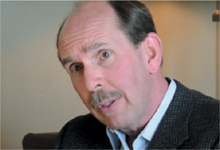
Dan Eilers
Dan said his father never understood his corporate life. Dan recalled:
He would say, ‘You should have gone to work at 8 and left at 5. Why did you work 70-hour weeks? You went to college. That should have meant you’d work only 40-hour weeks. You lost yourself for all those [corporate] years, but now you have reclaimed what I brought to you.’
Dr. Trainer saw the bigger world that lay ahead for Dan, though his father could not. However, his father would have appreciated that his son is now able to return to his roots—hunting, fishing, and hiking where they used to go as father and son so many years ago. And that, too, is part of the mentoring that has molded Dan’s life.
Beacons
Mentors can also help show you the way once you’ve identified your path. “When I was six years old I knew I wanted to be a CEO and an electrical engineer,” Rick Wallace told me. “I didn’t know what either of those things were, but that is what my grandfather was.”
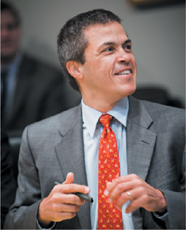
Rick Wallace
Both of Rick’s parents were college professors. His grandfather, David Sciaky, founded and ran Sciaky Brothers which was an innovator and global leader in welding technology. Rick remembers one of the highlights of his childhood as watching the Apollo moon landing in which Sciaky Brothers had been responsible for developing the welding technology that was deployed in the program. David Sciaky received the French Legion of Honor medal in recognition of his contributions to science and technology. His grandfather’s success and accomplishments made quite an impression on Rick:
To me it was about what technology could do, what it meant to own a company, and to run a company. I didn’t know what all that meant, but I had this idea from being a little boy around my grandfather’s company.
Years later, Rick was offered a sales position. Not sure what to do, he consulted with his grandfather, then in his late eighties, who said, “Look, you could do that. You’d get a nice car. You’d probably get a good salary. You could make good money. But you’ll never go back to being an engineer. So you’ll just have to decide if that’s what you want to do.” Rick declined the sales job.
Dan Warmenhoven recalls having many mentors along the way, but none greater than his father, Pete Warmenhoven, and his boss at IBM, Frank Metz:
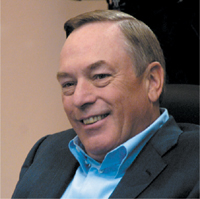
Dan Warmenhoven
My father worked in fresh produce packaging. The plant had about 300 warehouse people. Every morning he would walk the line, and everybody knew him, and they knew him as Pete, not as Mr. Warmenhoven. He knew most of them by name. That said something to me about how you interact with a team. It wasn’t leadership through power; it was leadership through personal connection. That had a huge influence on me.
Later in his career when Dan worked for Frank Metz, the CFO of IBM, he learned a critical lesson about modesty. Dan watched as Metz made recommendations about a controversial issue facing the company. After the meeting, Dan said:
‘Frank, that was just brilliant how you resolved that issue,’ to which Metz responded, ‘Don’t get too enamored with it. That decision will stick on the wall for about 24 hours. Those guys know I don’t have the final authority to make that decision.’
Dan observed:
He was very matter of fact about it. He understood his role, and he understood the limits of his power. He knew there’d be an escalation from the side that lost. To him it wasn’t an affront in any way, and he also didn’t feel as though the issue was over. It was a very philosophical kind of response. It said to me, ‘Don’t get too carried away with your power, because the dynamics of people and organizations often are more powerful than any position power that may be entrusted to one person.’
For Dan, the stories of these two mentors seem to say, “Don’t get a big head just because you’re the boss.”
Tricks of the Trade
Mentors teach you the tricks of the trade. At age 43, Brenda Rhodes was running a $10 million business that was going under because it was running out of cash. “I didn’t know how to read a financial statement or a balance sheet,” said the CEO who was raised on a sugar beet farm in Washington. “I didn’t know the language of finance. I was faking it.”
Determined not to allow her lack of knowledge about finance to hold her back, she enrolled in a three-year Harvard Business School executive program, called OPM: Owner, President, Manager. Her finance professor, Samuel Hayes, told her, “Brenda, you are brilliant operationally. I can tell. If you’ll stay with me through the basics, you’ll have that magical combination. I can teach anybody finance, but I can’t teach everybody operations. They just don’t have that same feel for the people and the process that you have.”
Brenda recalled:
Samuel Hayes gave me the confidence that I could actually learn finance, and so I did. The first year they taught me all about how to read a balance sheet, how to make a profit and loss statement work, what the levers were, and how to make the changes in my business to be successful.
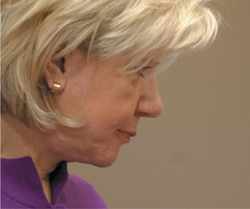
Brenda Rhodes
As Brenda went through the program, she built her business from $10 million to $28 million, to $40 million. Now she could negotiate with the bank because of her new finance skills. She then learned about venture capital and public markets. By the final year of the program, Brenda had taken her company public and raised $80 million.
She credits Samuel Hayes with teaching her what she needed to know. Mentors will teach you the tricks of the trade.
Hard Lessons
In his late 20s, Steve Blank was flying high as a VP of Marketing in a high-tech startup. During a high-level specifications meeting with engineers and scientists jumping into the discussion, he felt the need to give his opinion. After about five minutes, Allen Michels, the CEO, said, “Are you through?”
Instead of recognizing that things weren’t exactly going well, Steve’s ego drove him to continue for another few minutes. “I thought I was a genius,” he recalled. When he was done, Michels just looked at him. “Now are you done?” he asked as the people in the room who knew him began backing up their chairs, fully aware of what was about to hit.
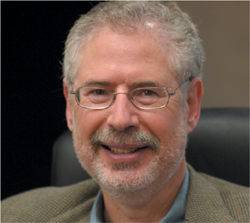
Steve Blank
Then Michels got in real close to Steve’s face, like a Marine drill sergeant, and started screaming at him:
You’re an embarrassment to the profession of marketing. You don’t know a damn thing of what you’re talking about. This room is full of people who’ve had 20 years of experience in talking to customers and understanding their needs. You don’t have a clue about what these customers need, and therefore you’re just wasting our time. Get the hell out of the building. Get the hell out of my company … and take the damn VP of Sales with you. Don’t come back until you know who our customers are.
Steve recalled, “I’d been fired publicly, and humiliated.”
Allen Michels became a mentor for Steve because he’d taught him a critical lesson: that facts about customers, rather than opinion, are what matter. That message not only changed Steve’s life, but his entire career. Although delivered by a two-by-four, the message is something Steve employed in growing his future businesses and now teaches to hundreds of students in his MBA classes at Berkeley and Stanford. He calls it Customer Development. He advised, “When marketers open their mouths, no one wants to hear their opinions. What they ought to be talking about are facts from customers.”
A second hard lesson. Not only did Steve Blank learn about the importance of knowing your customers from being fired by Allen Michels, he learned about consultative selling from one of the masters, Rob VanNaarden. As a young salesperson who was, in his own words, “not only completely clueless but enormously arrogant,” he found out the hard way that his approach wasn’t working. During one critical sales call, Steve had tried to make the sale by telling the engineering staff how smart he was and what idiots they were for not buying the products he was offering sooner. To his chagrin, he and Rob, his VP of Sales, were escorted out of the building.
A while later, Steve went on another sales call with VanNaarden who said:
“This time, let me handle it.” Steve watched in amazement as Rob opened with trivia about the local high school sports scores, and talked about family and kids. Steve was thinking, “What is all this wasted time about? Let’s get to the technology.” Rob went on to compliment the prospect. “Listen, I’m almost embarrassed we’re here. You guys are the smartest engineers the industry has ever seen. If you had the money we raised, and if your bosses had been smart enough to give it to you, you could have built better computers than we ever have.”
Steve could not believe how much time was being wasted. Finally, the prospect said to Rob, “Well listen Rob, now that you understand all that, we’re ready to talk. What do you have to show us?”
Steve continued to work with Rob who taught him about emotional intelligence and the art of consultative selling. It changed his business career forever.
Criticism as a “Present”
In addition to Rick Wallace’s grandfather, another early influence in his career was his boss, Gary Dickerson. Gary called Rick into his office one day and said, “I have a present for you.” Gary proceeded to give him some harsh criticism. Rick said, “How is this a present?” Gary responded, “No one else will tell you, and it will help make you more effective in your job.” Today, Rick does not hesitate to give difficult feedback to people, still using the idea that it’s a gift.
Role Models to Emulate
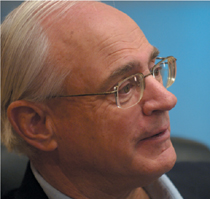
Ned Barnholt
Role models practice the kind of leadership you want to strive for. Ned Barnholt had just joined Hewlett-Packard Labs when he was asked to fix Bill Hewlett’s stereo, which he did. When Bill came to pick it up, he engaged Ned in a personal conversation about his career and about the company.
It was a life-changing moment for Ned. “Bill just chatted and asked ‘Why did you join the company? How do you like it here? What attracted you to HP?’ He spent 20 minutes talking to me as this young engineer, right out of school.”
Ned added:
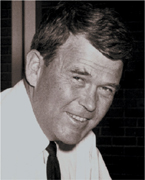
Bill Hewlett
That always impressed me. The CEO of the company cared about individuals at the entry level. When I became CEO I remembered that story and what a big difference it makes if I can take time to go around the labs or different places in the company to shake hands, talk to people, and get to know them a little personally. ‘Why did you join? How’s it going?’ That became a key part of my management style and philosophy.
Ned also recalled sitting next to Dave Packard at a dinner event and how genuine, open, and approachable Dave was.
Those early encounters with Bill Hewlett and Dave Packard had an impact on Ned’s management style for the rest of his life. He remembered what Dave Packard used to say, “You need to be hard-headed and soft-hearted.” Throughout his own career as a CEO, Ned made conscious efforts to treat employees as he’d been treated by Bill and Dave.
John Kispert learned a lot about business from his first boss, Billy Helmer, who owed a deli on Long Island where John worked as a 12-year-old. Billy would pick him up at 5:00 AM and drive him to work. Sometimes Billy would take John to the bar across the street about 7:00 AM. “Hey Johnny, watch this,” he’d say. Then he would yell out to the entire bar, “Hey, drinks are on me!” and buy a round for everyone. “What do you think every one of those guys is going to do now?” he asked every time before answering his own question. “They’ll come walking across the street to the deli to get a hero sandwich or a meatloaf to go with their beer.”
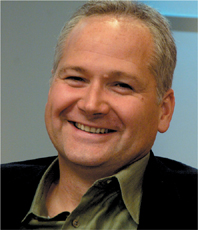
John Kispert
But it wasn’t just Billy’s marketing ploy that stuck with John, it was the dedication to one’s business and to one’s customers that he learned from his boss. John recalled:
He was very hard on me. He ran a good shop that did very well. His credo was, ‘There’s not a moment that you shouldn’t be doing something. You’re forever trying to take care of people and keep the cycle time of the store moving very quickly.’ He impressed that on me, over and over again. There’s always a window to be cleaned or a roast beef to be trimmed, or a potato salad to be made, or fresh coffee to be made, or a supplier to be paid. It’s a 24-by-7 business and you just stay on top of it. He was constantly on the move. Billy’s philosophy applies to any business. I’ve made it part of my muscle memory, and I carry it with me today.
Support System
A mentor stands solidly behind you, and gives you opportunities you might not otherwise have.
With a degree in agricultural economics, Ginger Graham’s first job was with a food production company called Elanco, a subsidiary of Eli Lilly. Ginger, who was born in a rural Arkansas town which she describes as “Five thousand people on a dirt road in the middle of nowhere,” recalled, “I had no exposure to row crops, soybeans, cotton, or rice. I was inexperienced in every sense, and I was also the first woman that was hired in that area.”
Ginger worked for a district sales manager, Charles Moody, who, along with his wife Anita, became like a second set of parents to the young person away from home. She recalled his support for her:
He embraced my development and spent a lot of time with me. He helped me understand how to compete, how to learn, how to grow up. I was 21 years old, and he was there when I didn’t know I needed someone … but did. He gave me great advice and counsel.
Ginger’s first sales assignment was in a large territory that had been chopped up into two smaller ones, and the previous sales rep had been reassigned. One giant customer dominated the territory, and they didn’t want to do business with a young, inexperienced female sales rep. So they called Charles Moody demanding to have their old sales rep back. He responded, “Gee, it’s a shame you won’t be doing business with us anymore, but when you’re ready, please call Ginger.” Ginger said:
He was willing to forego the business to make a point that he was going to stand by his employees and do what was right. And I admire him for that to this day. We still keep in touch. He’s very important to me.
Your Role: Give Back
The mentor is the one who helps you find your own way, but you have to be open. You have to ask questions. You can’t pretend to have all the answers. That takes guts, real guts1
—Joseph Campbell
These executives’ stories spell out the benefits of having a mentor. Getting one, however, depends in part on the realization that the mentor relationship is a two-way street.
A two-way street means that you aren’t just a passive recipient of knowledge. Steve Blank points out how critical it is that the mentee has something to give back. If you have nothing to offer, he suggests, then don’t ask somebody to be a mentor. Take classes or hire a coach who can help you meet or exceed your goals instead.
For Steve to take on a mentee, he needs to know that he’ll learn something in the process, just as his mentors did when they took him on:
My mentors saw something in me that made them smarter as well. So now when I mentor people, I am picking, not only people who I think are smart, but when the two of us get together, they make my head spin around as well. It’s the combination of that relationship over time that makes a mentorship. If you think you are in a place where you have something to offer, that’s different. Then you’re ready for mentorship.
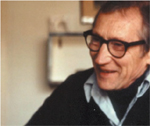
Bob Suczek
Between 1974 and 1977 while writing my PhD dissertation, I worked closely with a psychology professor from San Francisco State University named Bob Suczek (1918–2006). He was such an influence on my research and on my personal development as a psychologist that I dedicated my dissertation to him. When the sometimes grueling process was over and I’d completed my PhD, I wrote a letter to Bob thanking him for his loving guidance. He wrote back saying how much he valued the process and how good he thought the dissertation was. But his final sentence brought me to tears. “What you may not have known, Rick, is that I needed you as much as you needed me.”
Summary
All the executives I interviewed had somebody along the way who gave them the confidence, the inspiration, and the vision to move up. They mentioned relatives, bosses, CEOs, teachers, even a family doctor. Usually these people could see potential and talent in them that they could not see in themselves.
When you present to the top level, remember the people around that table had mentors early in their lives. They have deep feelings about that experience. While they may see you as the “mentee,” and you may see yourself that way too, remember it is a two-way street and you are providing them with information they need to make critical decisions. Keep in mind, they need you as much as you need them.

